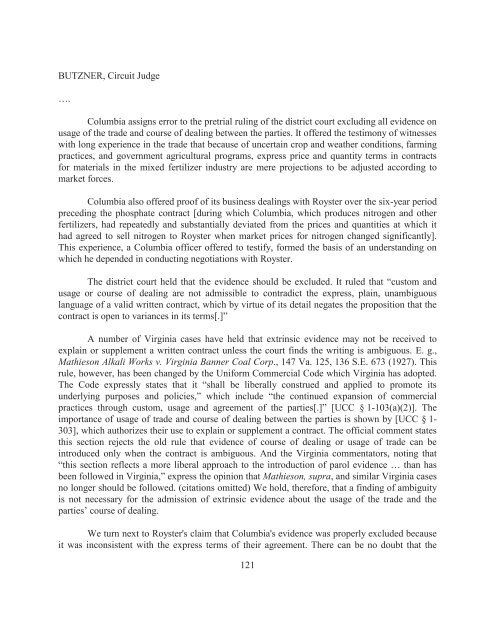Sales and Leases - A Problem-based Approach, 2016a
Sales and Leases - A Problem-based Approach, 2016a
Sales and Leases - A Problem-based Approach, 2016a
Create successful ePaper yourself
Turn your PDF publications into a flip-book with our unique Google optimized e-Paper software.
BUTZNER, Circuit Judge<br />
….<br />
Columbia assigns error to the pretrial ruling of the district court excluding all evidence on<br />
usage of the trade <strong>and</strong> course of dealing between the parties. It offered the testimony of witnesses<br />
with long experience in the trade that because of uncertain crop <strong>and</strong> weather conditions, farming<br />
practices, <strong>and</strong> government agricultural programs, express price <strong>and</strong> quantity terms in contracts<br />
for materials in the mixed fertilizer industry are mere projections to be adjusted according to<br />
market forces.<br />
Columbia also offered proof of its business dealings with Royster over the six-year period<br />
preceding the phosphate contract [during which Columbia, which produces nitrogen <strong>and</strong> other<br />
fertilizers, had repeatedly <strong>and</strong> substantially deviated from the prices <strong>and</strong> quantities at which it<br />
had agreed to sell nitrogen to Royster when market prices for nitrogen changed significantly].<br />
This experience, a Columbia officer offered to testify, formed the basis of an underst<strong>and</strong>ing on<br />
which he depended in conducting negotiations with Royster.<br />
The district court held that the evidence should be excluded. It ruled that “custom <strong>and</strong><br />
usage or course of dealing are not admissible to contradict the express, plain, unambiguous<br />
language of a valid written contract, which by virtue of its detail negates the proposition that the<br />
contract is open to variances in its terms[.]”<br />
A number of Virginia cases have held that extrinsic evidence may not be received to<br />
explain or supplement a written contract unless the court finds the writing is ambiguous. E. g.,<br />
Mathieson Alkali Works v. Virginia Banner Coal Corp., 147 Va. 125, 136 S.E. 673 (1927). This<br />
rule, however, has been changed by the Uniform Commercial Code which Virginia has adopted.<br />
The Code expressly states that it “shall be liberally construed <strong>and</strong> applied to promote its<br />
underlying purposes <strong>and</strong> policies,” which include “the continued expansion of commercial<br />
practices through custom, usage <strong>and</strong> agreement of the parties[.]” [UCC § 1-103(a)(2)]. The<br />
importance of usage of trade <strong>and</strong> course of dealing between the parties is shown by [UCC § 1-<br />
303], which authorizes their use to explain or supplement a contract. The official comment states<br />
this section rejects the old rule that evidence of course of dealing or usage of trade can be<br />
introduced only when the contract is ambiguous. And the Virginia commentators, noting that<br />
“this section reflects a more liberal approach to the introduction of parol evidence … than has<br />
been followed in Virginia,” express the opinion that Mathieson, supra, <strong>and</strong> similar Virginia cases<br />
no longer should be followed. (citations omitted) We hold, therefore, that a finding of ambiguity<br />
is not necessary for the admission of extrinsic evidence about the usage of the trade <strong>and</strong> the<br />
parties’ course of dealing.<br />
We turn next to Royster's claim that Columbia's evidence was properly excluded because<br />
it was inconsistent with the express terms of their agreement. There can be no doubt that the<br />
121


















